Cross-Cultural Report: Comparing Business in China and Romania
VerifiedAdded on 2020/06/06
|11
|3758
|90
Report
AI Summary
This report provides a cross-cultural analysis comparing China and Romania, focusing on the impact of cultural differences on business practices. It examines the cultural norms, values, and behaviors of both countries, highlighting their distinct characteristics in areas such as art, music, and religion. The assignment explores how companies, like Ursus Breweries, navigate these cultural differences when expanding internationally. It applies Hofstede's theory to analyze dimensions like power distance, individualism, masculinity, uncertainty avoidance, and long-term orientation. Furthermore, the report discusses the challenges of establishing businesses in foreign countries, including financial constraints and employee relations, while also touching upon the global economy and the importance of ethical and social responsibility in international business. The study provides insights into the unique cultural landscapes of China and Romania, and how they shape business strategies and opportunities.
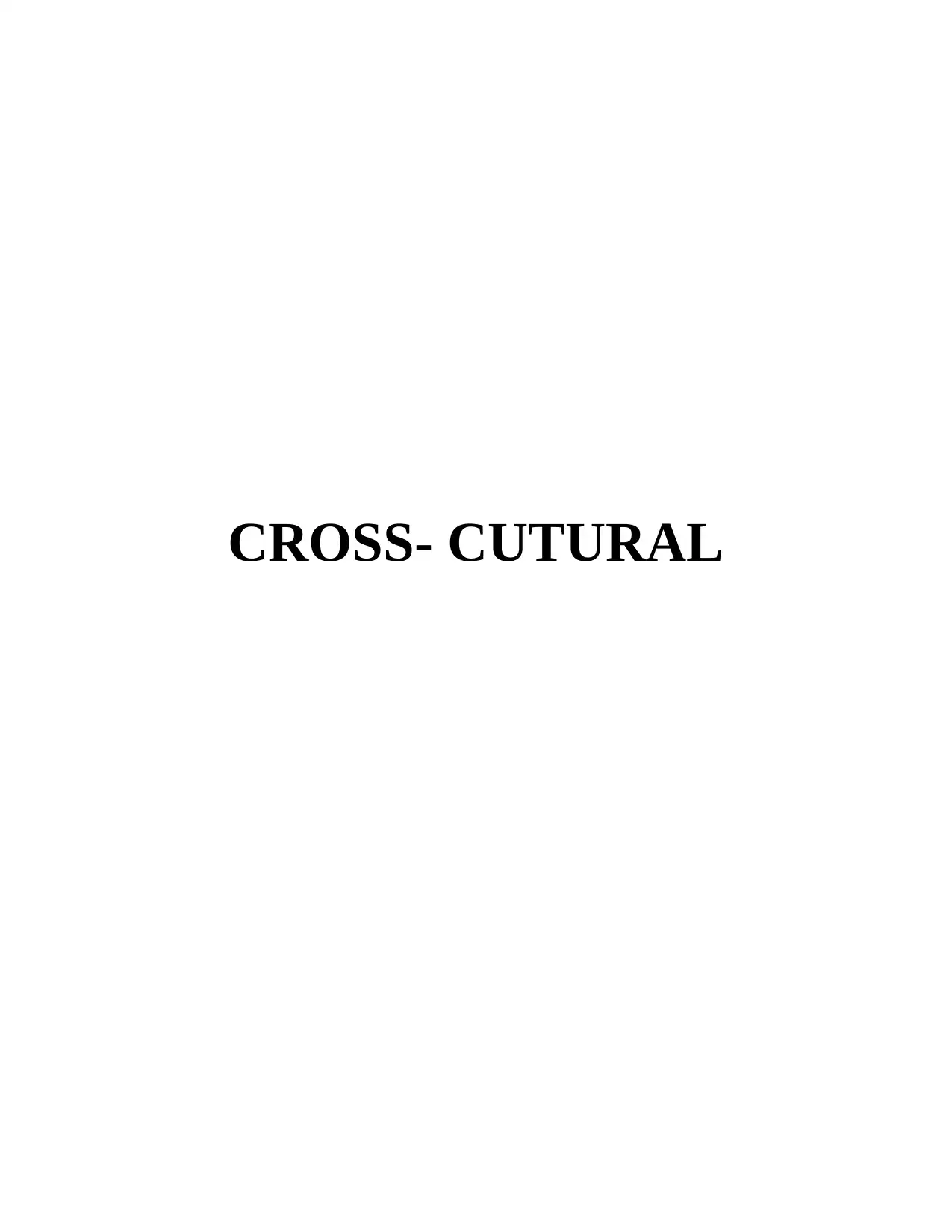
CROSS- CUTURAL
Paraphrase This Document
Need a fresh take? Get an instant paraphrase of this document with our AI Paraphraser
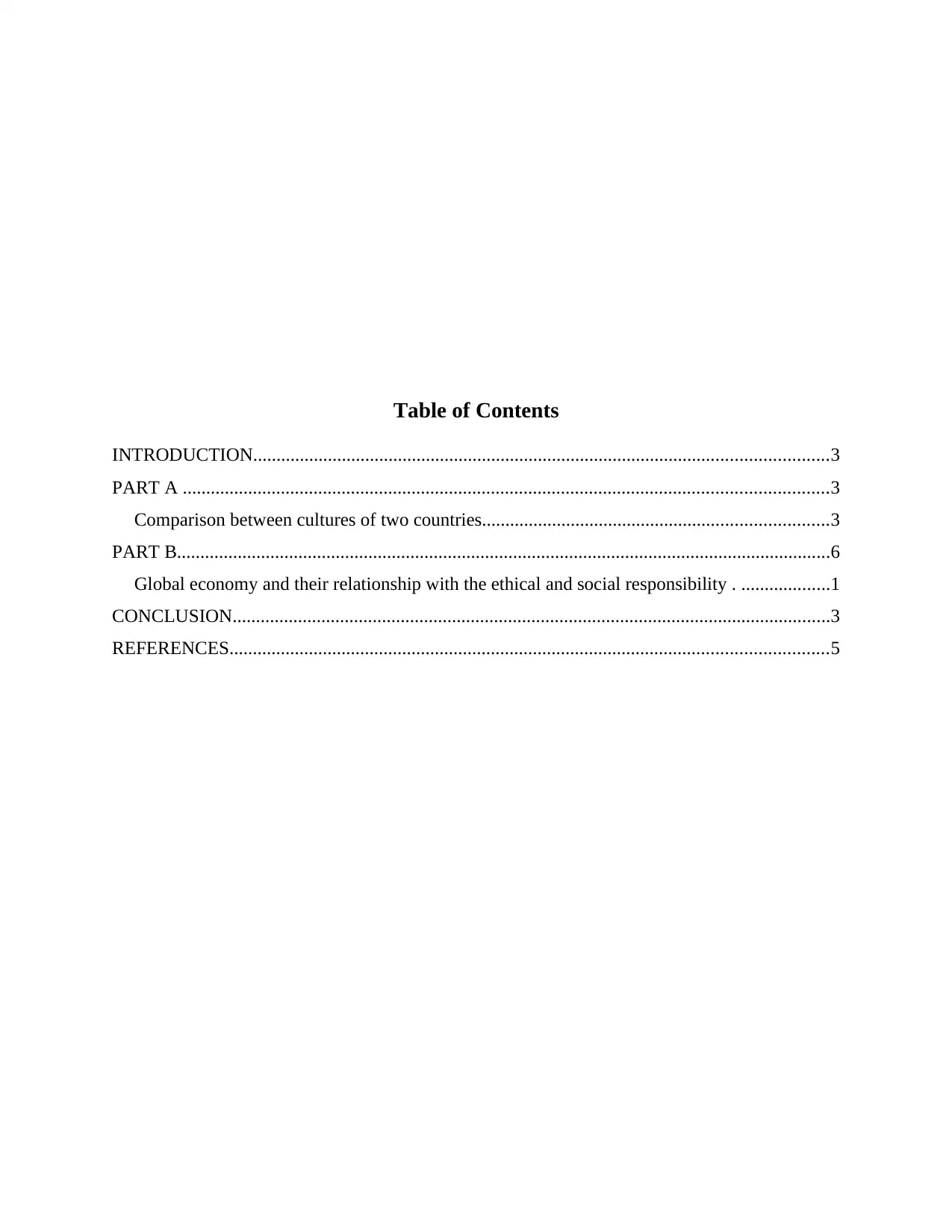
Table of Contents
INTRODUCTION...........................................................................................................................3
PART A ..........................................................................................................................................3
Comparison between cultures of two countries..........................................................................3
PART B............................................................................................................................................6
Global economy and their relationship with the ethical and social responsibility . ...................1
CONCLUSION................................................................................................................................3
REFERENCES................................................................................................................................5
INTRODUCTION...........................................................................................................................3
PART A ..........................................................................................................................................3
Comparison between cultures of two countries..........................................................................3
PART B............................................................................................................................................6
Global economy and their relationship with the ethical and social responsibility . ...................1
CONCLUSION................................................................................................................................3
REFERENCES................................................................................................................................5
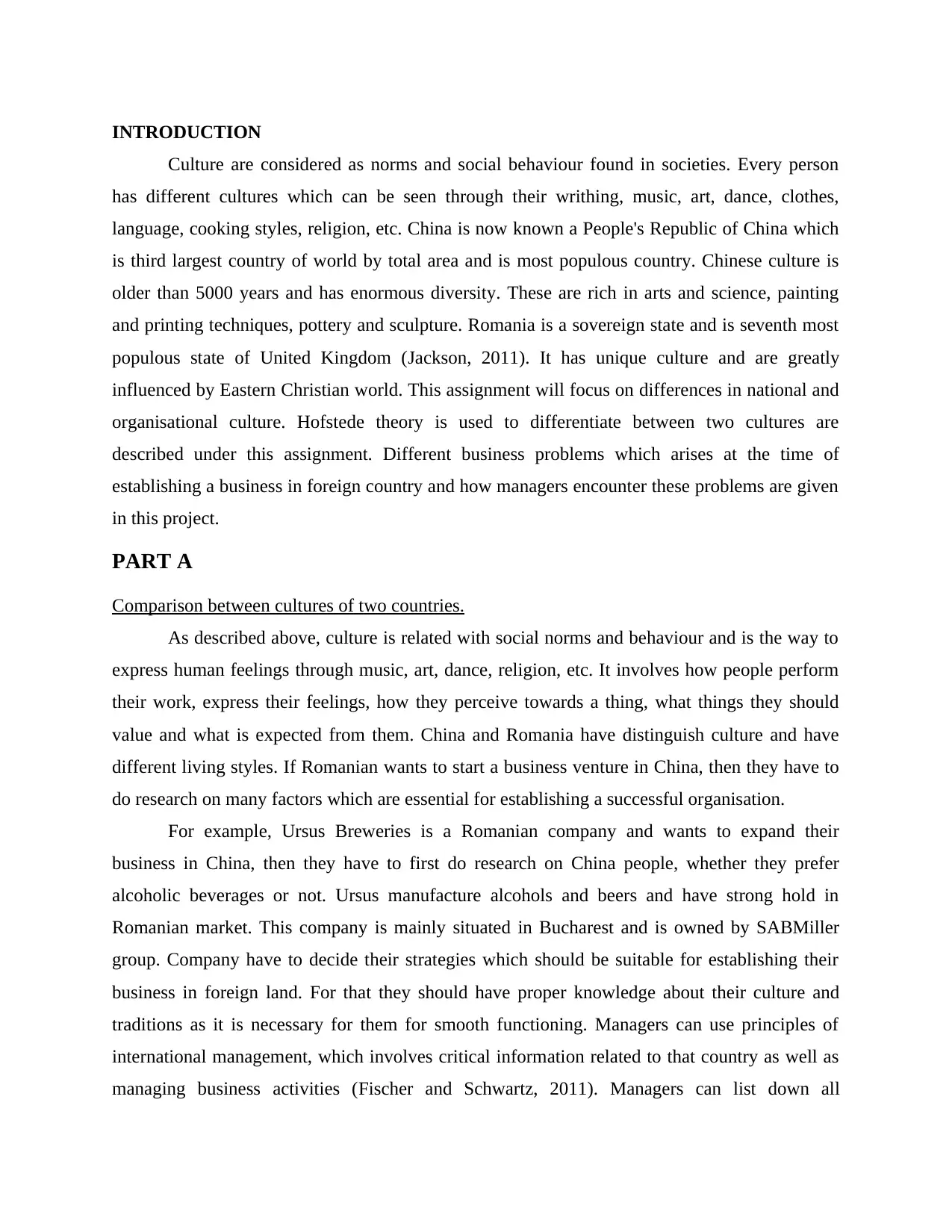
INTRODUCTION
Culture are considered as norms and social behaviour found in societies. Every person
has different cultures which can be seen through their writhing, music, art, dance, clothes,
language, cooking styles, religion, etc. China is now known a People's Republic of China which
is third largest country of world by total area and is most populous country. Chinese culture is
older than 5000 years and has enormous diversity. These are rich in arts and science, painting
and printing techniques, pottery and sculpture. Romania is a sovereign state and is seventh most
populous state of United Kingdom (Jackson, 2011). It has unique culture and are greatly
influenced by Eastern Christian world. This assignment will focus on differences in national and
organisational culture. Hofstede theory is used to differentiate between two cultures are
described under this assignment. Different business problems which arises at the time of
establishing a business in foreign country and how managers encounter these problems are given
in this project.
PART A
Comparison between cultures of two countries.
As described above, culture is related with social norms and behaviour and is the way to
express human feelings through music, art, dance, religion, etc. It involves how people perform
their work, express their feelings, how they perceive towards a thing, what things they should
value and what is expected from them. China and Romania have distinguish culture and have
different living styles. If Romanian wants to start a business venture in China, then they have to
do research on many factors which are essential for establishing a successful organisation.
For example, Ursus Breweries is a Romanian company and wants to expand their
business in China, then they have to first do research on China people, whether they prefer
alcoholic beverages or not. Ursus manufacture alcohols and beers and have strong hold in
Romanian market. This company is mainly situated in Bucharest and is owned by SABMiller
group. Company have to decide their strategies which should be suitable for establishing their
business in foreign land. For that they should have proper knowledge about their culture and
traditions as it is necessary for them for smooth functioning. Managers can use principles of
international management, which involves critical information related to that country as well as
managing business activities (Fischer and Schwartz, 2011). Managers can list down all
Culture are considered as norms and social behaviour found in societies. Every person
has different cultures which can be seen through their writhing, music, art, dance, clothes,
language, cooking styles, religion, etc. China is now known a People's Republic of China which
is third largest country of world by total area and is most populous country. Chinese culture is
older than 5000 years and has enormous diversity. These are rich in arts and science, painting
and printing techniques, pottery and sculpture. Romania is a sovereign state and is seventh most
populous state of United Kingdom (Jackson, 2011). It has unique culture and are greatly
influenced by Eastern Christian world. This assignment will focus on differences in national and
organisational culture. Hofstede theory is used to differentiate between two cultures are
described under this assignment. Different business problems which arises at the time of
establishing a business in foreign country and how managers encounter these problems are given
in this project.
PART A
Comparison between cultures of two countries.
As described above, culture is related with social norms and behaviour and is the way to
express human feelings through music, art, dance, religion, etc. It involves how people perform
their work, express their feelings, how they perceive towards a thing, what things they should
value and what is expected from them. China and Romania have distinguish culture and have
different living styles. If Romanian wants to start a business venture in China, then they have to
do research on many factors which are essential for establishing a successful organisation.
For example, Ursus Breweries is a Romanian company and wants to expand their
business in China, then they have to first do research on China people, whether they prefer
alcoholic beverages or not. Ursus manufacture alcohols and beers and have strong hold in
Romanian market. This company is mainly situated in Bucharest and is owned by SABMiller
group. Company have to decide their strategies which should be suitable for establishing their
business in foreign land. For that they should have proper knowledge about their culture and
traditions as it is necessary for them for smooth functioning. Managers can use principles of
international management, which involves critical information related to that country as well as
managing business activities (Fischer and Schwartz, 2011). Managers can list down all
⊘ This is a preview!⊘
Do you want full access?
Subscribe today to unlock all pages.

Trusted by 1+ million students worldwide
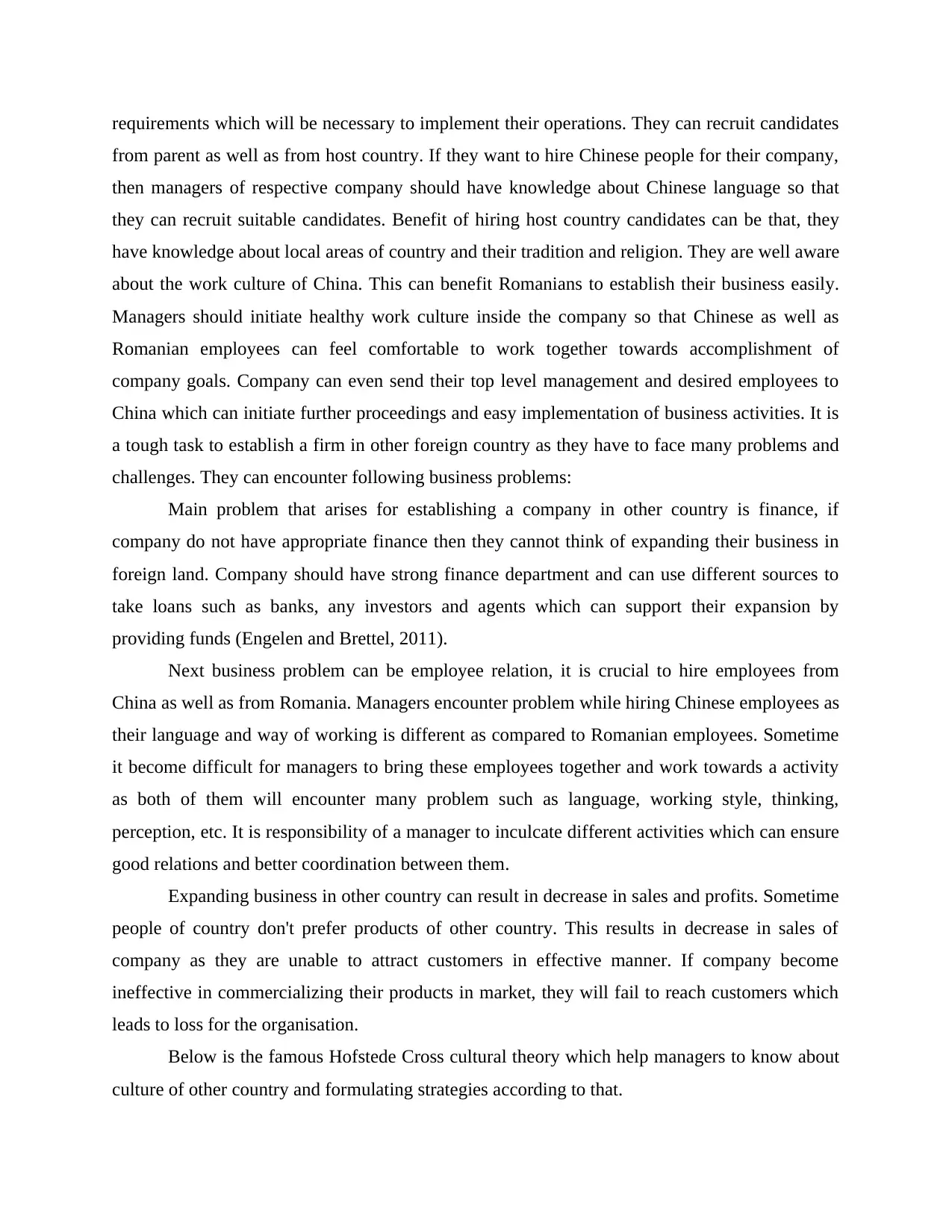
requirements which will be necessary to implement their operations. They can recruit candidates
from parent as well as from host country. If they want to hire Chinese people for their company,
then managers of respective company should have knowledge about Chinese language so that
they can recruit suitable candidates. Benefit of hiring host country candidates can be that, they
have knowledge about local areas of country and their tradition and religion. They are well aware
about the work culture of China. This can benefit Romanians to establish their business easily.
Managers should initiate healthy work culture inside the company so that Chinese as well as
Romanian employees can feel comfortable to work together towards accomplishment of
company goals. Company can even send their top level management and desired employees to
China which can initiate further proceedings and easy implementation of business activities. It is
a tough task to establish a firm in other foreign country as they have to face many problems and
challenges. They can encounter following business problems:
Main problem that arises for establishing a company in other country is finance, if
company do not have appropriate finance then they cannot think of expanding their business in
foreign land. Company should have strong finance department and can use different sources to
take loans such as banks, any investors and agents which can support their expansion by
providing funds (Engelen and Brettel, 2011).
Next business problem can be employee relation, it is crucial to hire employees from
China as well as from Romania. Managers encounter problem while hiring Chinese employees as
their language and way of working is different as compared to Romanian employees. Sometime
it become difficult for managers to bring these employees together and work towards a activity
as both of them will encounter many problem such as language, working style, thinking,
perception, etc. It is responsibility of a manager to inculcate different activities which can ensure
good relations and better coordination between them.
Expanding business in other country can result in decrease in sales and profits. Sometime
people of country don't prefer products of other country. This results in decrease in sales of
company as they are unable to attract customers in effective manner. If company become
ineffective in commercializing their products in market, they will fail to reach customers which
leads to loss for the organisation.
Below is the famous Hofstede Cross cultural theory which help managers to know about
culture of other country and formulating strategies according to that.
from parent as well as from host country. If they want to hire Chinese people for their company,
then managers of respective company should have knowledge about Chinese language so that
they can recruit suitable candidates. Benefit of hiring host country candidates can be that, they
have knowledge about local areas of country and their tradition and religion. They are well aware
about the work culture of China. This can benefit Romanians to establish their business easily.
Managers should initiate healthy work culture inside the company so that Chinese as well as
Romanian employees can feel comfortable to work together towards accomplishment of
company goals. Company can even send their top level management and desired employees to
China which can initiate further proceedings and easy implementation of business activities. It is
a tough task to establish a firm in other foreign country as they have to face many problems and
challenges. They can encounter following business problems:
Main problem that arises for establishing a company in other country is finance, if
company do not have appropriate finance then they cannot think of expanding their business in
foreign land. Company should have strong finance department and can use different sources to
take loans such as banks, any investors and agents which can support their expansion by
providing funds (Engelen and Brettel, 2011).
Next business problem can be employee relation, it is crucial to hire employees from
China as well as from Romania. Managers encounter problem while hiring Chinese employees as
their language and way of working is different as compared to Romanian employees. Sometime
it become difficult for managers to bring these employees together and work towards a activity
as both of them will encounter many problem such as language, working style, thinking,
perception, etc. It is responsibility of a manager to inculcate different activities which can ensure
good relations and better coordination between them.
Expanding business in other country can result in decrease in sales and profits. Sometime
people of country don't prefer products of other country. This results in decrease in sales of
company as they are unable to attract customers in effective manner. If company become
ineffective in commercializing their products in market, they will fail to reach customers which
leads to loss for the organisation.
Below is the famous Hofstede Cross cultural theory which help managers to know about
culture of other country and formulating strategies according to that.
Paraphrase This Document
Need a fresh take? Get an instant paraphrase of this document with our AI Paraphraser
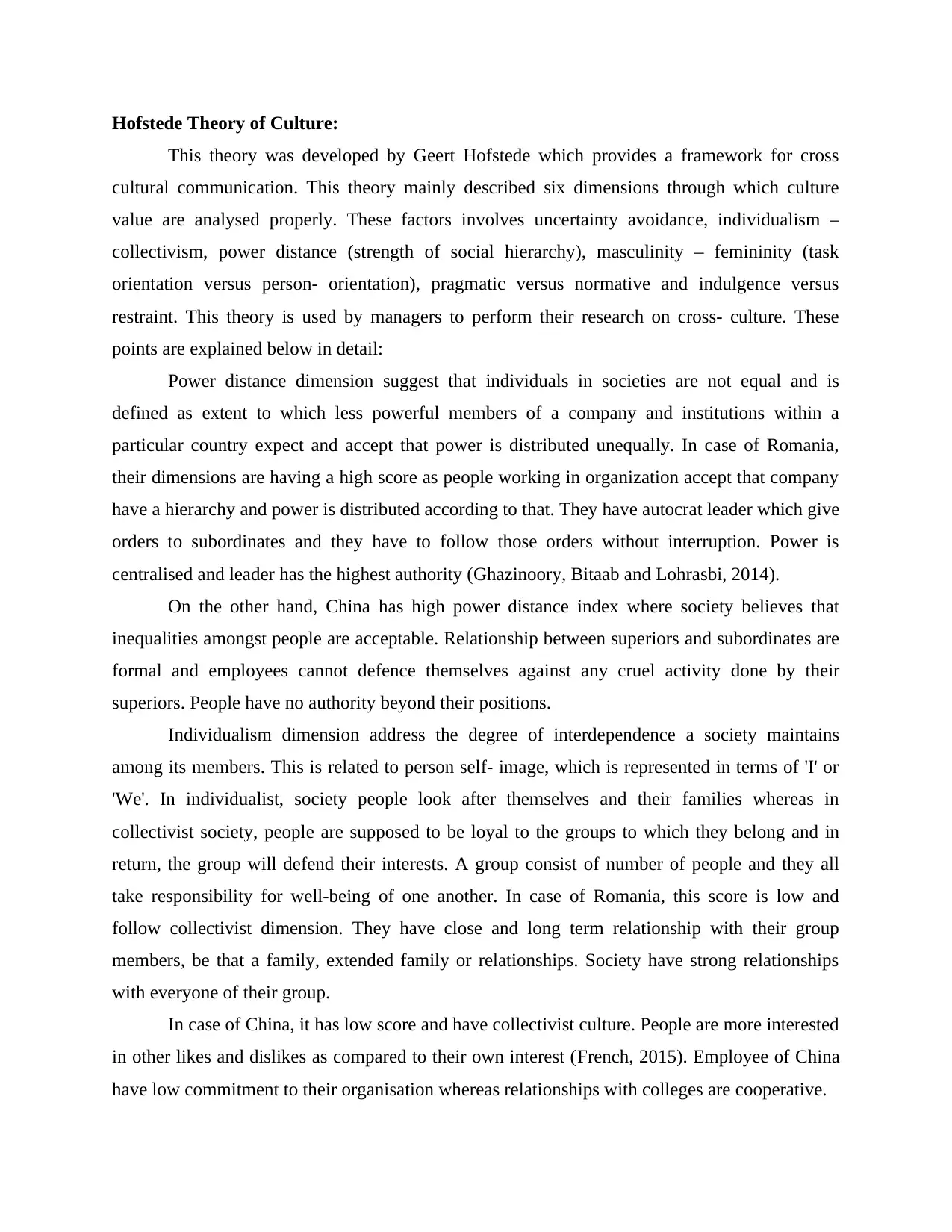
Hofstede Theory of Culture:
This theory was developed by Geert Hofstede which provides a framework for cross
cultural communication. This theory mainly described six dimensions through which culture
value are analysed properly. These factors involves uncertainty avoidance, individualism –
collectivism, power distance (strength of social hierarchy), masculinity – femininity (task
orientation versus person- orientation), pragmatic versus normative and indulgence versus
restraint. This theory is used by managers to perform their research on cross- culture. These
points are explained below in detail:
Power distance dimension suggest that individuals in societies are not equal and is
defined as extent to which less powerful members of a company and institutions within a
particular country expect and accept that power is distributed unequally. In case of Romania,
their dimensions are having a high score as people working in organization accept that company
have a hierarchy and power is distributed according to that. They have autocrat leader which give
orders to subordinates and they have to follow those orders without interruption. Power is
centralised and leader has the highest authority (Ghazinoory, Bitaab and Lohrasbi, 2014).
On the other hand, China has high power distance index where society believes that
inequalities amongst people are acceptable. Relationship between superiors and subordinates are
formal and employees cannot defence themselves against any cruel activity done by their
superiors. People have no authority beyond their positions.
Individualism dimension address the degree of interdependence a society maintains
among its members. This is related to person self- image, which is represented in terms of 'I' or
'We'. In individualist, society people look after themselves and their families whereas in
collectivist society, people are supposed to be loyal to the groups to which they belong and in
return, the group will defend their interests. A group consist of number of people and they all
take responsibility for well-being of one another. In case of Romania, this score is low and
follow collectivist dimension. They have close and long term relationship with their group
members, be that a family, extended family or relationships. Society have strong relationships
with everyone of their group.
In case of China, it has low score and have collectivist culture. People are more interested
in other likes and dislikes as compared to their own interest (French, 2015). Employee of China
have low commitment to their organisation whereas relationships with colleges are cooperative.
This theory was developed by Geert Hofstede which provides a framework for cross
cultural communication. This theory mainly described six dimensions through which culture
value are analysed properly. These factors involves uncertainty avoidance, individualism –
collectivism, power distance (strength of social hierarchy), masculinity – femininity (task
orientation versus person- orientation), pragmatic versus normative and indulgence versus
restraint. This theory is used by managers to perform their research on cross- culture. These
points are explained below in detail:
Power distance dimension suggest that individuals in societies are not equal and is
defined as extent to which less powerful members of a company and institutions within a
particular country expect and accept that power is distributed unequally. In case of Romania,
their dimensions are having a high score as people working in organization accept that company
have a hierarchy and power is distributed according to that. They have autocrat leader which give
orders to subordinates and they have to follow those orders without interruption. Power is
centralised and leader has the highest authority (Ghazinoory, Bitaab and Lohrasbi, 2014).
On the other hand, China has high power distance index where society believes that
inequalities amongst people are acceptable. Relationship between superiors and subordinates are
formal and employees cannot defence themselves against any cruel activity done by their
superiors. People have no authority beyond their positions.
Individualism dimension address the degree of interdependence a society maintains
among its members. This is related to person self- image, which is represented in terms of 'I' or
'We'. In individualist, society people look after themselves and their families whereas in
collectivist society, people are supposed to be loyal to the groups to which they belong and in
return, the group will defend their interests. A group consist of number of people and they all
take responsibility for well-being of one another. In case of Romania, this score is low and
follow collectivist dimension. They have close and long term relationship with their group
members, be that a family, extended family or relationships. Society have strong relationships
with everyone of their group.
In case of China, it has low score and have collectivist culture. People are more interested
in other likes and dislikes as compared to their own interest (French, 2015). Employee of China
have low commitment to their organisation whereas relationships with colleges are cooperative.
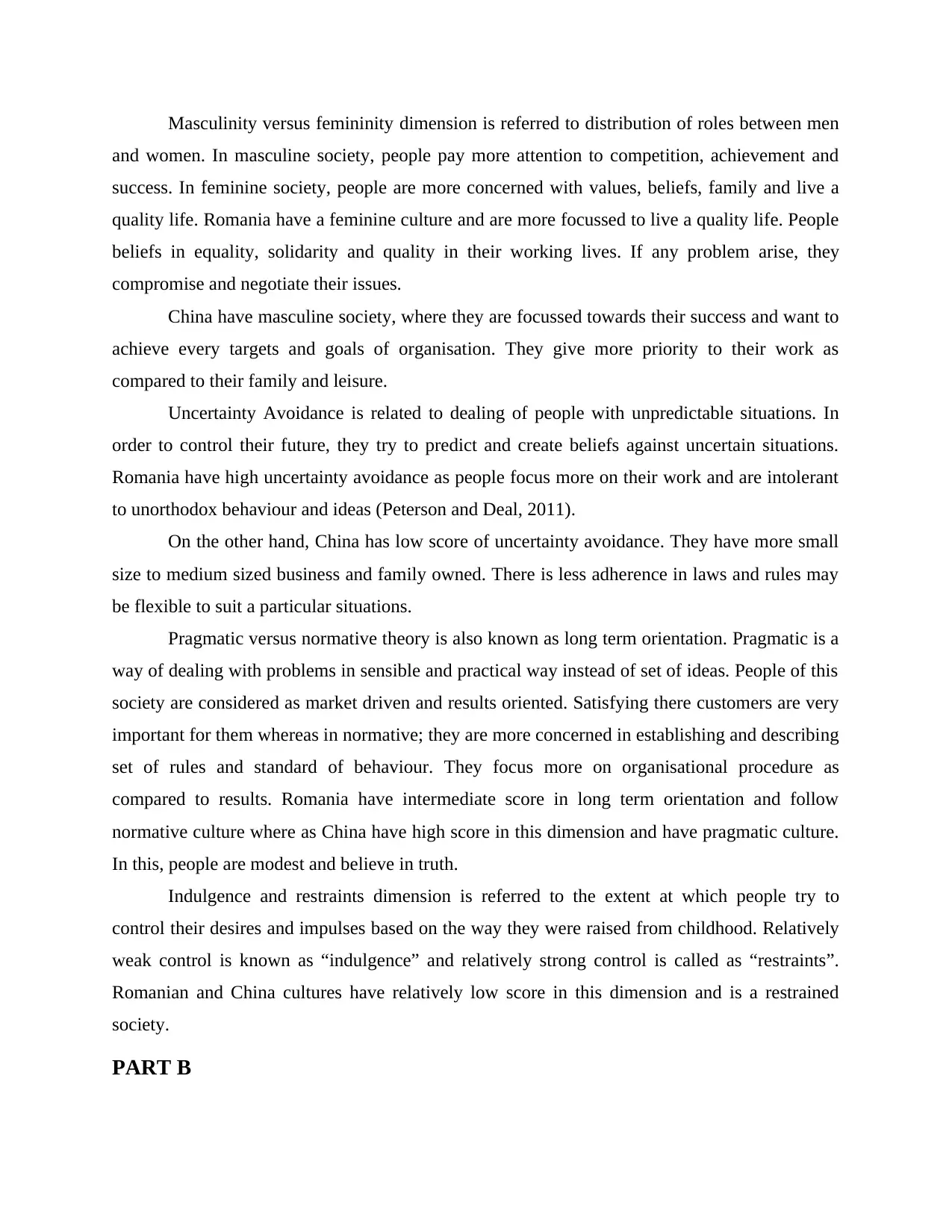
Masculinity versus femininity dimension is referred to distribution of roles between men
and women. In masculine society, people pay more attention to competition, achievement and
success. In feminine society, people are more concerned with values, beliefs, family and live a
quality life. Romania have a feminine culture and are more focussed to live a quality life. People
beliefs in equality, solidarity and quality in their working lives. If any problem arise, they
compromise and negotiate their issues.
China have masculine society, where they are focussed towards their success and want to
achieve every targets and goals of organisation. They give more priority to their work as
compared to their family and leisure.
Uncertainty Avoidance is related to dealing of people with unpredictable situations. In
order to control their future, they try to predict and create beliefs against uncertain situations.
Romania have high uncertainty avoidance as people focus more on their work and are intolerant
to unorthodox behaviour and ideas (Peterson and Deal, 2011).
On the other hand, China has low score of uncertainty avoidance. They have more small
size to medium sized business and family owned. There is less adherence in laws and rules may
be flexible to suit a particular situations.
Pragmatic versus normative theory is also known as long term orientation. Pragmatic is a
way of dealing with problems in sensible and practical way instead of set of ideas. People of this
society are considered as market driven and results oriented. Satisfying there customers are very
important for them whereas in normative; they are more concerned in establishing and describing
set of rules and standard of behaviour. They focus more on organisational procedure as
compared to results. Romania have intermediate score in long term orientation and follow
normative culture where as China have high score in this dimension and have pragmatic culture.
In this, people are modest and believe in truth.
Indulgence and restraints dimension is referred to the extent at which people try to
control their desires and impulses based on the way they were raised from childhood. Relatively
weak control is known as “indulgence” and relatively strong control is called as “restraints”.
Romanian and China cultures have relatively low score in this dimension and is a restrained
society.
PART B
and women. In masculine society, people pay more attention to competition, achievement and
success. In feminine society, people are more concerned with values, beliefs, family and live a
quality life. Romania have a feminine culture and are more focussed to live a quality life. People
beliefs in equality, solidarity and quality in their working lives. If any problem arise, they
compromise and negotiate their issues.
China have masculine society, where they are focussed towards their success and want to
achieve every targets and goals of organisation. They give more priority to their work as
compared to their family and leisure.
Uncertainty Avoidance is related to dealing of people with unpredictable situations. In
order to control their future, they try to predict and create beliefs against uncertain situations.
Romania have high uncertainty avoidance as people focus more on their work and are intolerant
to unorthodox behaviour and ideas (Peterson and Deal, 2011).
On the other hand, China has low score of uncertainty avoidance. They have more small
size to medium sized business and family owned. There is less adherence in laws and rules may
be flexible to suit a particular situations.
Pragmatic versus normative theory is also known as long term orientation. Pragmatic is a
way of dealing with problems in sensible and practical way instead of set of ideas. People of this
society are considered as market driven and results oriented. Satisfying there customers are very
important for them whereas in normative; they are more concerned in establishing and describing
set of rules and standard of behaviour. They focus more on organisational procedure as
compared to results. Romania have intermediate score in long term orientation and follow
normative culture where as China have high score in this dimension and have pragmatic culture.
In this, people are modest and believe in truth.
Indulgence and restraints dimension is referred to the extent at which people try to
control their desires and impulses based on the way they were raised from childhood. Relatively
weak control is known as “indulgence” and relatively strong control is called as “restraints”.
Romanian and China cultures have relatively low score in this dimension and is a restrained
society.
PART B
⊘ This is a preview!⊘
Do you want full access?
Subscribe today to unlock all pages.

Trusted by 1+ million students worldwide
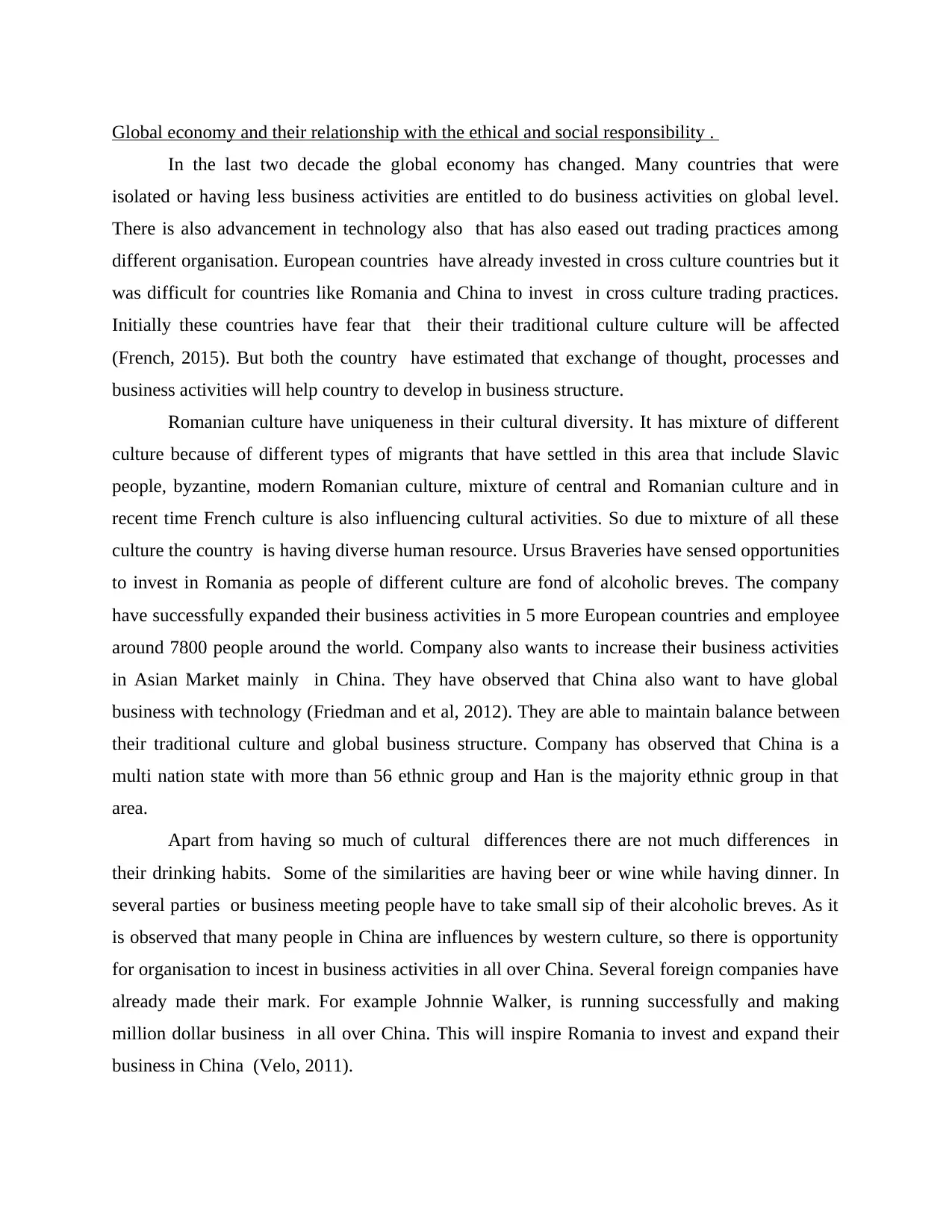
Global economy and their relationship with the ethical and social responsibility .
In the last two decade the global economy has changed. Many countries that were
isolated or having less business activities are entitled to do business activities on global level.
There is also advancement in technology also that has also eased out trading practices among
different organisation. European countries have already invested in cross culture countries but it
was difficult for countries like Romania and China to invest in cross culture trading practices.
Initially these countries have fear that their their traditional culture culture will be affected
(French, 2015). But both the country have estimated that exchange of thought, processes and
business activities will help country to develop in business structure.
Romanian culture have uniqueness in their cultural diversity. It has mixture of different
culture because of different types of migrants that have settled in this area that include Slavic
people, byzantine, modern Romanian culture, mixture of central and Romanian culture and in
recent time French culture is also influencing cultural activities. So due to mixture of all these
culture the country is having diverse human resource. Ursus Braveries have sensed opportunities
to invest in Romania as people of different culture are fond of alcoholic breves. The company
have successfully expanded their business activities in 5 more European countries and employee
around 7800 people around the world. Company also wants to increase their business activities
in Asian Market mainly in China. They have observed that China also want to have global
business with technology (Friedman and et al, 2012). They are able to maintain balance between
their traditional culture and global business structure. Company has observed that China is a
multi nation state with more than 56 ethnic group and Han is the majority ethnic group in that
area.
Apart from having so much of cultural differences there are not much differences in
their drinking habits. Some of the similarities are having beer or wine while having dinner. In
several parties or business meeting people have to take small sip of their alcoholic breves. As it
is observed that many people in China are influences by western culture, so there is opportunity
for organisation to incest in business activities in all over China. Several foreign companies have
already made their mark. For example Johnnie Walker, is running successfully and making
million dollar business in all over China. This will inspire Romania to invest and expand their
business in China (Velo, 2011).
In the last two decade the global economy has changed. Many countries that were
isolated or having less business activities are entitled to do business activities on global level.
There is also advancement in technology also that has also eased out trading practices among
different organisation. European countries have already invested in cross culture countries but it
was difficult for countries like Romania and China to invest in cross culture trading practices.
Initially these countries have fear that their their traditional culture culture will be affected
(French, 2015). But both the country have estimated that exchange of thought, processes and
business activities will help country to develop in business structure.
Romanian culture have uniqueness in their cultural diversity. It has mixture of different
culture because of different types of migrants that have settled in this area that include Slavic
people, byzantine, modern Romanian culture, mixture of central and Romanian culture and in
recent time French culture is also influencing cultural activities. So due to mixture of all these
culture the country is having diverse human resource. Ursus Braveries have sensed opportunities
to invest in Romania as people of different culture are fond of alcoholic breves. The company
have successfully expanded their business activities in 5 more European countries and employee
around 7800 people around the world. Company also wants to increase their business activities
in Asian Market mainly in China. They have observed that China also want to have global
business with technology (Friedman and et al, 2012). They are able to maintain balance between
their traditional culture and global business structure. Company has observed that China is a
multi nation state with more than 56 ethnic group and Han is the majority ethnic group in that
area.
Apart from having so much of cultural differences there are not much differences in
their drinking habits. Some of the similarities are having beer or wine while having dinner. In
several parties or business meeting people have to take small sip of their alcoholic breves. As it
is observed that many people in China are influences by western culture, so there is opportunity
for organisation to incest in business activities in all over China. Several foreign companies have
already made their mark. For example Johnnie Walker, is running successfully and making
million dollar business in all over China. This will inspire Romania to invest and expand their
business in China (Velo, 2011).
Paraphrase This Document
Need a fresh take? Get an instant paraphrase of this document with our AI Paraphraser
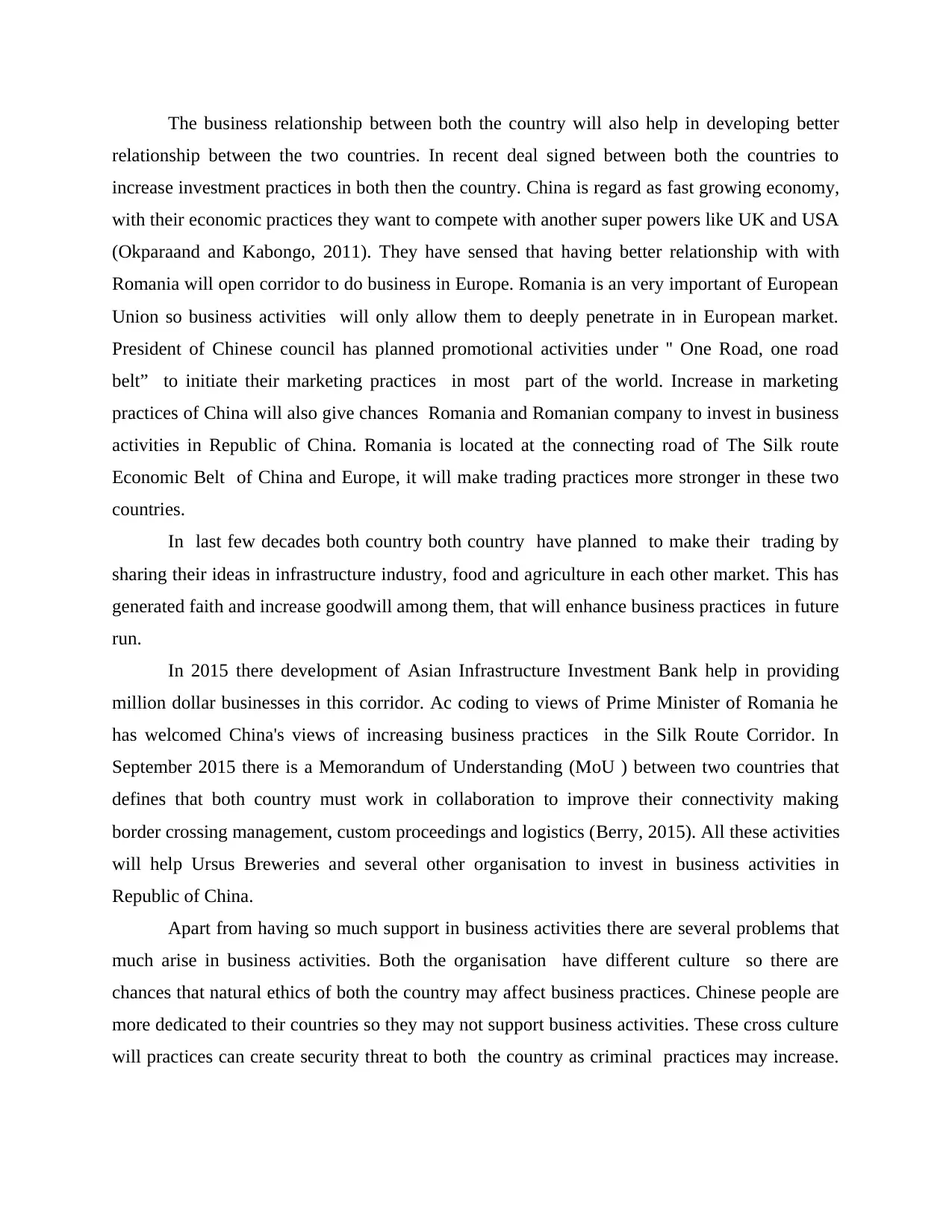
The business relationship between both the country will also help in developing better
relationship between the two countries. In recent deal signed between both the countries to
increase investment practices in both then the country. China is regard as fast growing economy,
with their economic practices they want to compete with another super powers like UK and USA
(Okparaand and Kabongo, 2011). They have sensed that having better relationship with with
Romania will open corridor to do business in Europe. Romania is an very important of European
Union so business activities will only allow them to deeply penetrate in in European market.
President of Chinese council has planned promotional activities under '' One Road, one road
belt” to initiate their marketing practices in most part of the world. Increase in marketing
practices of China will also give chances Romania and Romanian company to invest in business
activities in Republic of China. Romania is located at the connecting road of The Silk route
Economic Belt of China and Europe, it will make trading practices more stronger in these two
countries.
In last few decades both country both country have planned to make their trading by
sharing their ideas in infrastructure industry, food and agriculture in each other market. This has
generated faith and increase goodwill among them, that will enhance business practices in future
run.
In 2015 there development of Asian Infrastructure Investment Bank help in providing
million dollar businesses in this corridor. Ac coding to views of Prime Minister of Romania he
has welcomed China's views of increasing business practices in the Silk Route Corridor. In
September 2015 there is a Memorandum of Understanding (MoU ) between two countries that
defines that both country must work in collaboration to improve their connectivity making
border crossing management, custom proceedings and logistics (Berry, 2015). All these activities
will help Ursus Breweries and several other organisation to invest in business activities in
Republic of China.
Apart from having so much support in business activities there are several problems that
much arise in business activities. Both the organisation have different culture so there are
chances that natural ethics of both the country may affect business practices. Chinese people are
more dedicated to their countries so they may not support business activities. These cross culture
will practices can create security threat to both the country as criminal practices may increase.
relationship between the two countries. In recent deal signed between both the countries to
increase investment practices in both then the country. China is regard as fast growing economy,
with their economic practices they want to compete with another super powers like UK and USA
(Okparaand and Kabongo, 2011). They have sensed that having better relationship with with
Romania will open corridor to do business in Europe. Romania is an very important of European
Union so business activities will only allow them to deeply penetrate in in European market.
President of Chinese council has planned promotional activities under '' One Road, one road
belt” to initiate their marketing practices in most part of the world. Increase in marketing
practices of China will also give chances Romania and Romanian company to invest in business
activities in Republic of China. Romania is located at the connecting road of The Silk route
Economic Belt of China and Europe, it will make trading practices more stronger in these two
countries.
In last few decades both country both country have planned to make their trading by
sharing their ideas in infrastructure industry, food and agriculture in each other market. This has
generated faith and increase goodwill among them, that will enhance business practices in future
run.
In 2015 there development of Asian Infrastructure Investment Bank help in providing
million dollar businesses in this corridor. Ac coding to views of Prime Minister of Romania he
has welcomed China's views of increasing business practices in the Silk Route Corridor. In
September 2015 there is a Memorandum of Understanding (MoU ) between two countries that
defines that both country must work in collaboration to improve their connectivity making
border crossing management, custom proceedings and logistics (Berry, 2015). All these activities
will help Ursus Breweries and several other organisation to invest in business activities in
Republic of China.
Apart from having so much support in business activities there are several problems that
much arise in business activities. Both the organisation have different culture so there are
chances that natural ethics of both the country may affect business practices. Chinese people are
more dedicated to their countries so they may not support business activities. These cross culture
will practices can create security threat to both the country as criminal practices may increase.
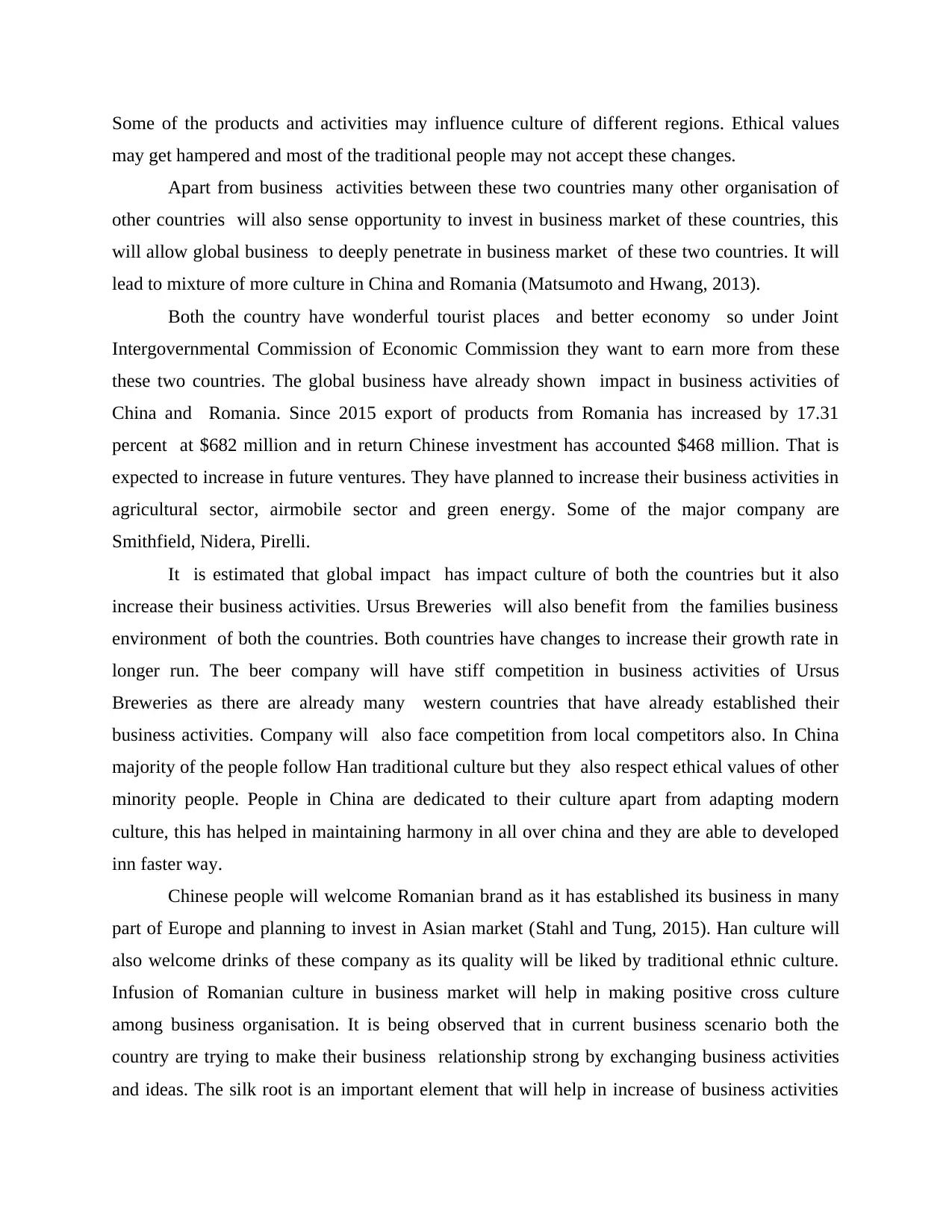
Some of the products and activities may influence culture of different regions. Ethical values
may get hampered and most of the traditional people may not accept these changes.
Apart from business activities between these two countries many other organisation of
other countries will also sense opportunity to invest in business market of these countries, this
will allow global business to deeply penetrate in business market of these two countries. It will
lead to mixture of more culture in China and Romania (Matsumoto and Hwang, 2013).
Both the country have wonderful tourist places and better economy so under Joint
Intergovernmental Commission of Economic Commission they want to earn more from these
these two countries. The global business have already shown impact in business activities of
China and Romania. Since 2015 export of products from Romania has increased by 17.31
percent at $682 million and in return Chinese investment has accounted $468 million. That is
expected to increase in future ventures. They have planned to increase their business activities in
agricultural sector, airmobile sector and green energy. Some of the major company are
Smithfield, Nidera, Pirelli.
It is estimated that global impact has impact culture of both the countries but it also
increase their business activities. Ursus Breweries will also benefit from the families business
environment of both the countries. Both countries have changes to increase their growth rate in
longer run. The beer company will have stiff competition in business activities of Ursus
Breweries as there are already many western countries that have already established their
business activities. Company will also face competition from local competitors also. In China
majority of the people follow Han traditional culture but they also respect ethical values of other
minority people. People in China are dedicated to their culture apart from adapting modern
culture, this has helped in maintaining harmony in all over china and they are able to developed
inn faster way.
Chinese people will welcome Romanian brand as it has established its business in many
part of Europe and planning to invest in Asian market (Stahl and Tung, 2015). Han culture will
also welcome drinks of these company as its quality will be liked by traditional ethnic culture.
Infusion of Romanian culture in business market will help in making positive cross culture
among business organisation. It is being observed that in current business scenario both the
country are trying to make their business relationship strong by exchanging business activities
and ideas. The silk root is an important element that will help in increase of business activities
may get hampered and most of the traditional people may not accept these changes.
Apart from business activities between these two countries many other organisation of
other countries will also sense opportunity to invest in business market of these countries, this
will allow global business to deeply penetrate in business market of these two countries. It will
lead to mixture of more culture in China and Romania (Matsumoto and Hwang, 2013).
Both the country have wonderful tourist places and better economy so under Joint
Intergovernmental Commission of Economic Commission they want to earn more from these
these two countries. The global business have already shown impact in business activities of
China and Romania. Since 2015 export of products from Romania has increased by 17.31
percent at $682 million and in return Chinese investment has accounted $468 million. That is
expected to increase in future ventures. They have planned to increase their business activities in
agricultural sector, airmobile sector and green energy. Some of the major company are
Smithfield, Nidera, Pirelli.
It is estimated that global impact has impact culture of both the countries but it also
increase their business activities. Ursus Breweries will also benefit from the families business
environment of both the countries. Both countries have changes to increase their growth rate in
longer run. The beer company will have stiff competition in business activities of Ursus
Breweries as there are already many western countries that have already established their
business activities. Company will also face competition from local competitors also. In China
majority of the people follow Han traditional culture but they also respect ethical values of other
minority people. People in China are dedicated to their culture apart from adapting modern
culture, this has helped in maintaining harmony in all over china and they are able to developed
inn faster way.
Chinese people will welcome Romanian brand as it has established its business in many
part of Europe and planning to invest in Asian market (Stahl and Tung, 2015). Han culture will
also welcome drinks of these company as its quality will be liked by traditional ethnic culture.
Infusion of Romanian culture in business market will help in making positive cross culture
among business organisation. It is being observed that in current business scenario both the
country are trying to make their business relationship strong by exchanging business activities
and ideas. The silk root is an important element that will help in increase of business activities
⊘ This is a preview!⊘
Do you want full access?
Subscribe today to unlock all pages.

Trusted by 1+ million students worldwide
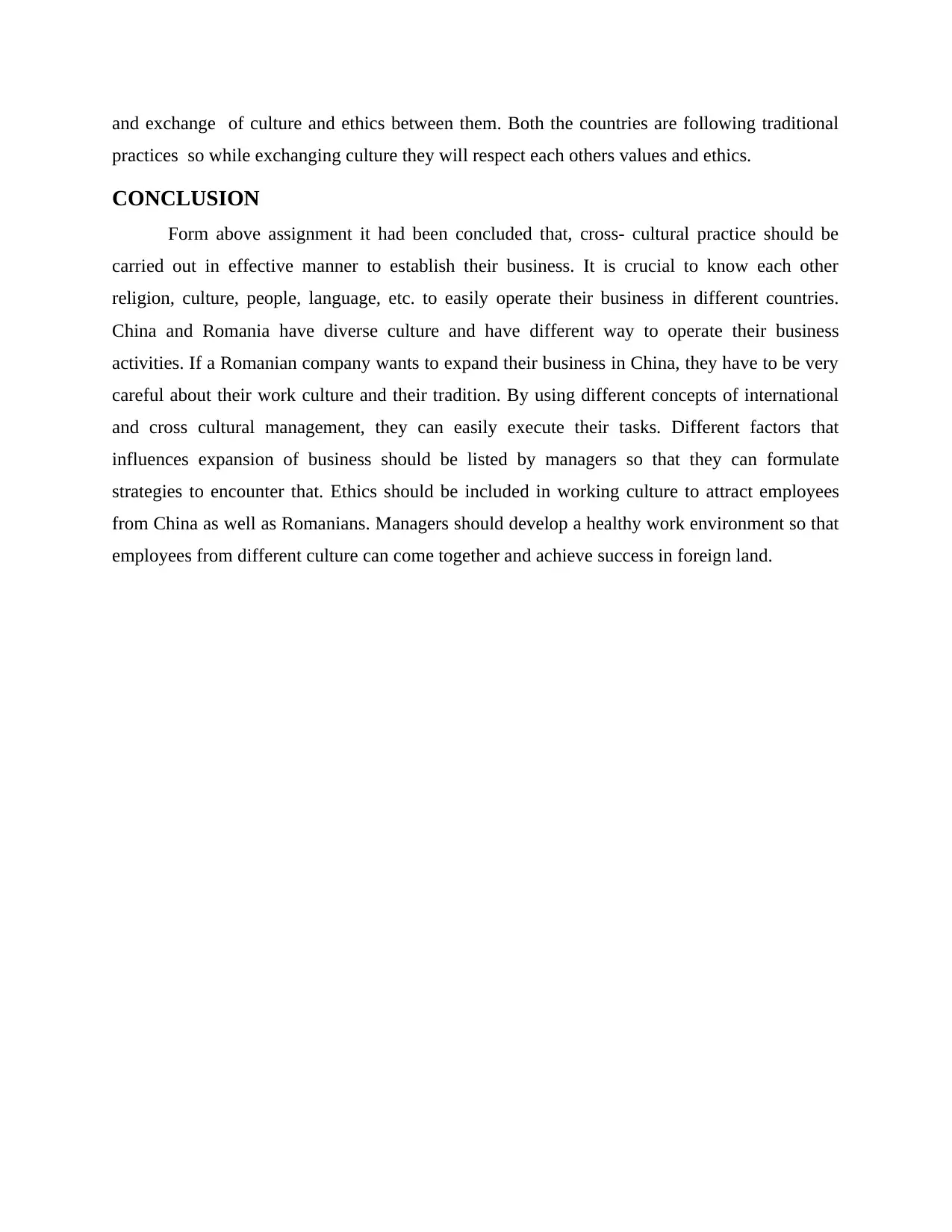
and exchange of culture and ethics between them. Both the countries are following traditional
practices so while exchanging culture they will respect each others values and ethics.
CONCLUSION
Form above assignment it had been concluded that, cross- cultural practice should be
carried out in effective manner to establish their business. It is crucial to know each other
religion, culture, people, language, etc. to easily operate their business in different countries.
China and Romania have diverse culture and have different way to operate their business
activities. If a Romanian company wants to expand their business in China, they have to be very
careful about their work culture and their tradition. By using different concepts of international
and cross cultural management, they can easily execute their tasks. Different factors that
influences expansion of business should be listed by managers so that they can formulate
strategies to encounter that. Ethics should be included in working culture to attract employees
from China as well as Romanians. Managers should develop a healthy work environment so that
employees from different culture can come together and achieve success in foreign land.
practices so while exchanging culture they will respect each others values and ethics.
CONCLUSION
Form above assignment it had been concluded that, cross- cultural practice should be
carried out in effective manner to establish their business. It is crucial to know each other
religion, culture, people, language, etc. to easily operate their business in different countries.
China and Romania have diverse culture and have different way to operate their business
activities. If a Romanian company wants to expand their business in China, they have to be very
careful about their work culture and their tradition. By using different concepts of international
and cross cultural management, they can easily execute their tasks. Different factors that
influences expansion of business should be listed by managers so that they can formulate
strategies to encounter that. Ethics should be included in working culture to attract employees
from China as well as Romanians. Managers should develop a healthy work environment so that
employees from different culture can come together and achieve success in foreign land.
Paraphrase This Document
Need a fresh take? Get an instant paraphrase of this document with our AI Paraphraser
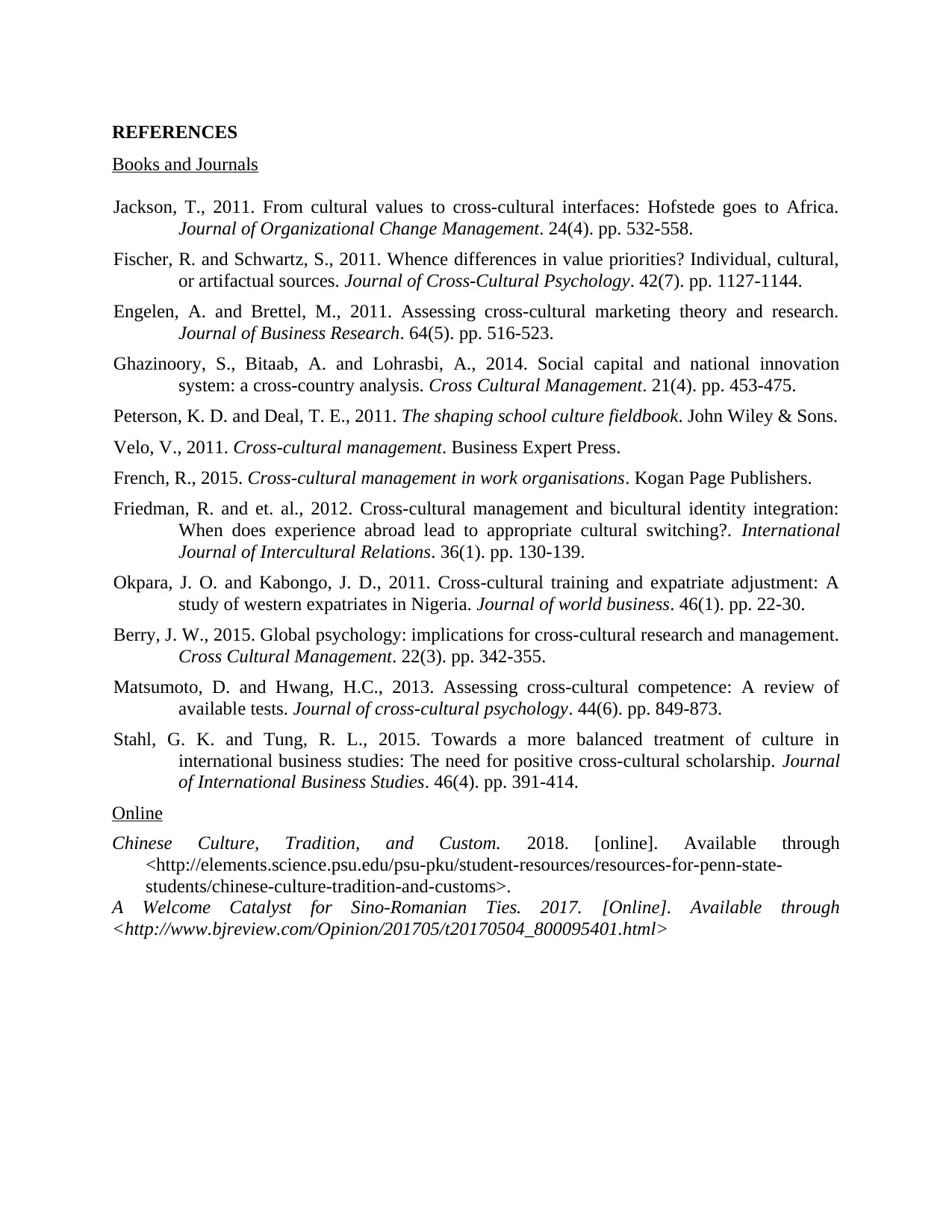
REFERENCES
Books and Journals
Jackson, T., 2011. From cultural values to cross-cultural interfaces: Hofstede goes to Africa.
Journal of Organizational Change Management. 24(4). pp. 532-558.
Fischer, R. and Schwartz, S., 2011. Whence differences in value priorities? Individual, cultural,
or artifactual sources. Journal of Cross-Cultural Psychology. 42(7). pp. 1127-1144.
Engelen, A. and Brettel, M., 2011. Assessing cross-cultural marketing theory and research.
Journal of Business Research. 64(5). pp. 516-523.
Ghazinoory, S., Bitaab, A. and Lohrasbi, A., 2014. Social capital and national innovation
system: a cross-country analysis. Cross Cultural Management. 21(4). pp. 453-475.
Peterson, K. D. and Deal, T. E., 2011. The shaping school culture fieldbook. John Wiley & Sons.
Velo, V., 2011. Cross-cultural management. Business Expert Press.
French, R., 2015. Cross-cultural management in work organisations. Kogan Page Publishers.
Friedman, R. and et. al., 2012. Cross-cultural management and bicultural identity integration:
When does experience abroad lead to appropriate cultural switching?. International
Journal of Intercultural Relations. 36(1). pp. 130-139.
Okpara, J. O. and Kabongo, J. D., 2011. Cross-cultural training and expatriate adjustment: A
study of western expatriates in Nigeria. Journal of world business. 46(1). pp. 22-30.
Berry, J. W., 2015. Global psychology: implications for cross-cultural research and management.
Cross Cultural Management. 22(3). pp. 342-355.
Matsumoto, D. and Hwang, H.C., 2013. Assessing cross-cultural competence: A review of
available tests. Journal of cross-cultural psychology. 44(6). pp. 849-873.
Stahl, G. K. and Tung, R. L., 2015. Towards a more balanced treatment of culture in
international business studies: The need for positive cross-cultural scholarship. Journal
of International Business Studies. 46(4). pp. 391-414.
Online
Chinese Culture, Tradition, and Custom. 2018. [online]. Available through
<http://elements.science.psu.edu/psu-pku/student-resources/resources-for-penn-state-
students/chinese-culture-tradition-and-customs>.
A Welcome Catalyst for Sino-Romanian Ties. 2017. [Online]. Available through
<http://www.bjreview.com/Opinion/201705/t20170504_800095401.html>
Books and Journals
Jackson, T., 2011. From cultural values to cross-cultural interfaces: Hofstede goes to Africa.
Journal of Organizational Change Management. 24(4). pp. 532-558.
Fischer, R. and Schwartz, S., 2011. Whence differences in value priorities? Individual, cultural,
or artifactual sources. Journal of Cross-Cultural Psychology. 42(7). pp. 1127-1144.
Engelen, A. and Brettel, M., 2011. Assessing cross-cultural marketing theory and research.
Journal of Business Research. 64(5). pp. 516-523.
Ghazinoory, S., Bitaab, A. and Lohrasbi, A., 2014. Social capital and national innovation
system: a cross-country analysis. Cross Cultural Management. 21(4). pp. 453-475.
Peterson, K. D. and Deal, T. E., 2011. The shaping school culture fieldbook. John Wiley & Sons.
Velo, V., 2011. Cross-cultural management. Business Expert Press.
French, R., 2015. Cross-cultural management in work organisations. Kogan Page Publishers.
Friedman, R. and et. al., 2012. Cross-cultural management and bicultural identity integration:
When does experience abroad lead to appropriate cultural switching?. International
Journal of Intercultural Relations. 36(1). pp. 130-139.
Okpara, J. O. and Kabongo, J. D., 2011. Cross-cultural training and expatriate adjustment: A
study of western expatriates in Nigeria. Journal of world business. 46(1). pp. 22-30.
Berry, J. W., 2015. Global psychology: implications for cross-cultural research and management.
Cross Cultural Management. 22(3). pp. 342-355.
Matsumoto, D. and Hwang, H.C., 2013. Assessing cross-cultural competence: A review of
available tests. Journal of cross-cultural psychology. 44(6). pp. 849-873.
Stahl, G. K. and Tung, R. L., 2015. Towards a more balanced treatment of culture in
international business studies: The need for positive cross-cultural scholarship. Journal
of International Business Studies. 46(4). pp. 391-414.
Online
Chinese Culture, Tradition, and Custom. 2018. [online]. Available through
<http://elements.science.psu.edu/psu-pku/student-resources/resources-for-penn-state-
students/chinese-culture-tradition-and-customs>.
A Welcome Catalyst for Sino-Romanian Ties. 2017. [Online]. Available through
<http://www.bjreview.com/Opinion/201705/t20170504_800095401.html>
1 out of 11
Related Documents
Your All-in-One AI-Powered Toolkit for Academic Success.
+13062052269
info@desklib.com
Available 24*7 on WhatsApp / Email
![[object Object]](/_next/static/media/star-bottom.7253800d.svg)
Unlock your academic potential
Copyright © 2020–2026 A2Z Services. All Rights Reserved. Developed and managed by ZUCOL.




